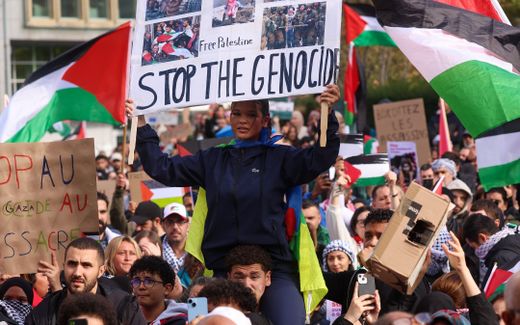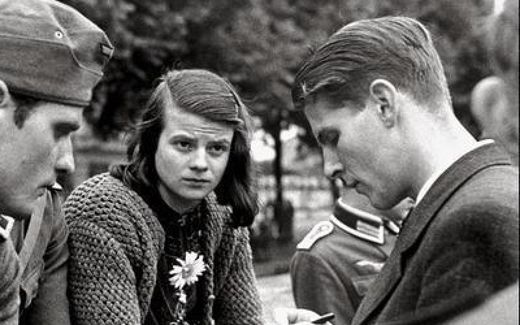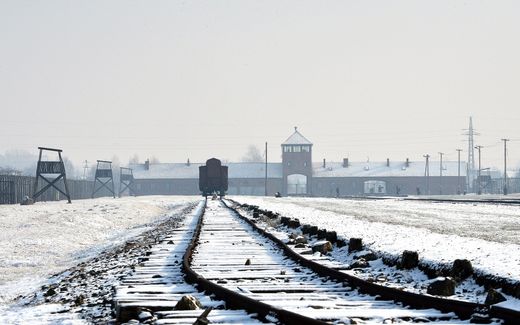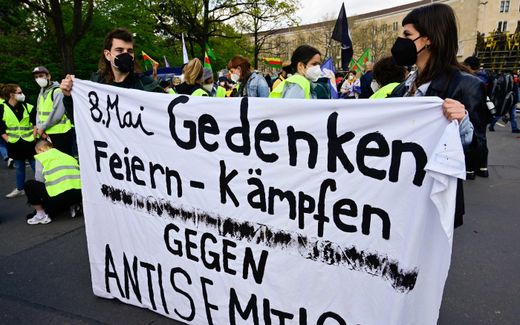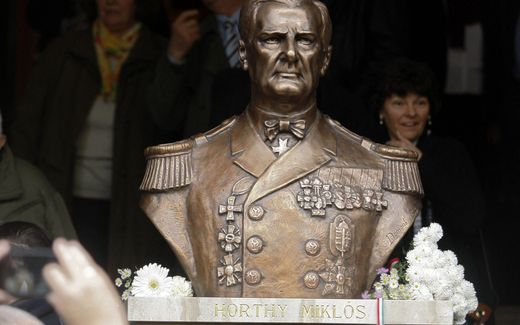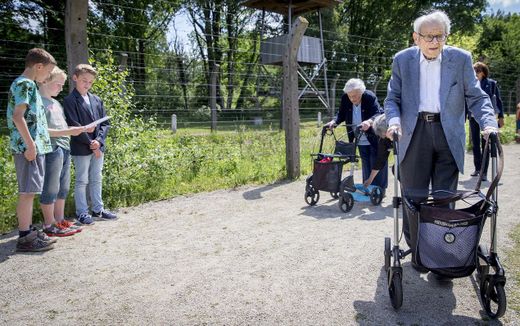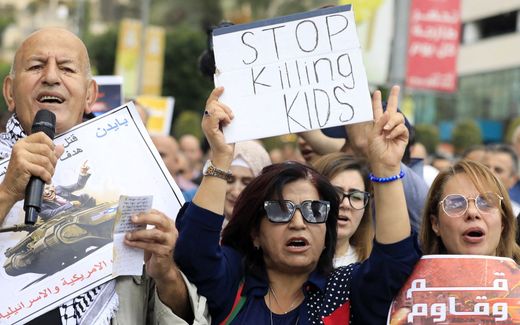GDR opposed Jews and Israel
09-11-2023
Central Europe
René Zeeman, RD
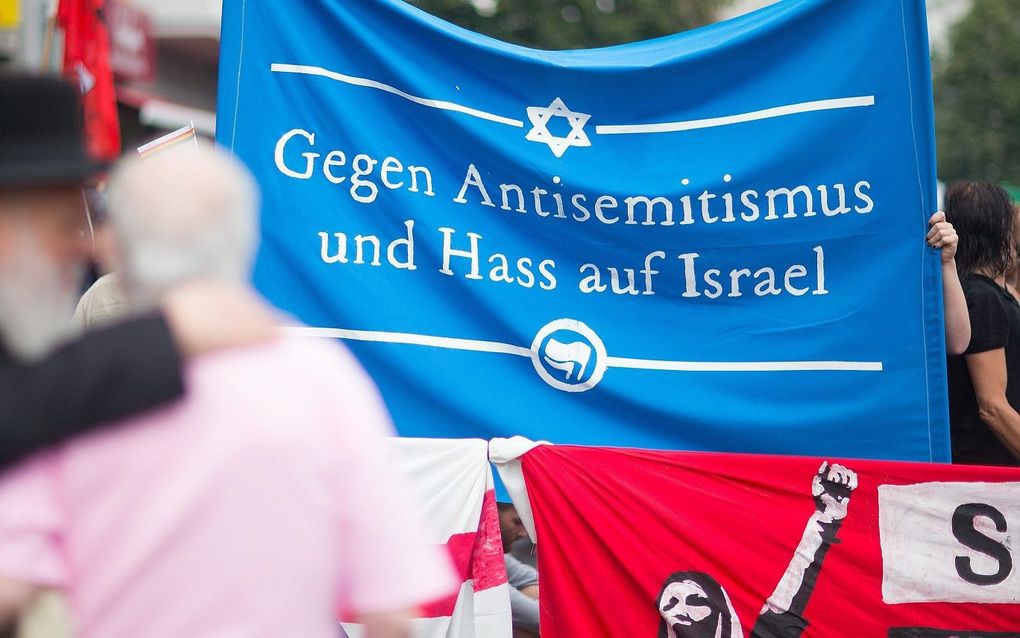
Pro Israel activists hold a banner reading 'Against Anti-Semitism and hate of Israel'. Anti-Semitism is especially present in Eastern Germany. It can be traced back partly to the anti-Semitic attitude of the German Democratic Republic. Photo EPA, Hannibal Hanschke
Central Europe
Chancellor Olaf Scholz argues that Germany has only one place when it comes to Israel, and that is on the side of the Jewish state. In the German Democratic Republic (GDR), it was completely different.
The exhibition "Ein anderes Land. Jüdisch in der DDR" (A different country. Jewish in the GDR) focuses on Jewish life in the former communist East German state. Through audio recordings and letters, the museum features prominent and ordinary Jews. They tell what it meant to be Jewish in the GDR. The anti-Semitism and anti-Zionism of the GDR are mentioned only indirectly. The compilers of the exhibition stay mostly on the surface. Hopefully, it will nevertheless encourage visitors to delve into the history of Jews in East Germany.
Driven by the hope of building a better Germany, free from anti-Semitism, Jewish communists such as the artist Lea Grundig, the writer Anna Seghers and the later GDR diplomat Josef Zimmering moved to the Russian occupation zone after the capitulation of Nazi Germany. For most of them, the political ideal was paramount; their Jewish origins had little or no significance.
How many Jews in total settled in eastern Germany is not known. They joined the Jews who emerged from hiding and those who had been spared by marriage to a non-Jewish partner. Altogether, several thousand Jews were involved.
Executed
Just a few years after the creation of the GDR in 1949, Jews no longer felt safe there. In the early 1950s, persecution of Jews began to occur in several Eastern European states. In 1952, Jewish communists, including Deputy Prime Minister Rudolf Slansky, stood trial in Czechoslovakia. They were accused "of Titoism, Zionism and national communism". Eleven of them were sentenced to death and executed.
At the same time, Stalin hunted down Jewish doctors who were supposedly after him. In his eyes, the medics were "Jewish nationalists, henchmen of the US imperialists".
In the GDR, Paul Merker, a member of the communist party's executive committee, got into trouble. He spoke in favour of the state of Israel and called for compensation for Jews and Jewesses expropriated in World War II. The communist party SED rejected reparations as "looting of hard-working German workers". Merker was sentenced to eight years in prison for his political agitation "against the interests of the German people".
Example
Jewish communities in the GDR were accused of collaborating with the Zionists and came under surveillance. Several Jewish party members and officials lost their jobs.
More than 500 Jews and Jewesses left the GDR. Among them was Julius Meyer, the chairman of the Jewish communities in the GDR and a member of the Volkskammer, the East German parliament. He fled to the West overnight in 1953. Five of the eight communal presidents followed his example. The Association of the Persecuted of the Nazi Regime, which campaigned for the victims of the Nazi regime, had to depose some board members and was subsequently forced to dissolve itself.
As a result, Jewish life in the GDR was on the wane eight years after World War II. The Jews barely possessed any buildings, and there was a shortage of rabbis. In fact, only the congregation in East Berlin existed. The others consisted of a few people. These were all elderly people. There were barely any young people. In 1961, the Jewish community in the GDR consisted of only 1,500 members. This number dropped to 380 in 1989.
The Jews who remained had to improvise to keep Jewish life going. For instance, a kosher butcher in Berlin's Prenzlauer Berg district had mostly diplomats from Arab countries as customers. With the death of Rabbi Riesenburger in 1965, there was no rabbi left in the GDR.
Necklace
Cathy Gelbin, born in 1963, asked her parents for a silver Star of David on a chain when she was 14 to mark the occasion of the Jugendweihe. The Jugendweihe is the atheist alternative to the confession of faith. "My mother took some silver objects to a jeweller, asking if he could make a Star of David out of them. The jeweller got scared and refused the request. Friends from West Berlin then brought a necklace with a Star of David. At school, I always wore the necklace. I was stopped, and people asked me what it meant and why I was wearing it."
Cathy Gelbin is the granddaughter of East German writer Stefan Heym. As a youngster, she was intensely involved in Jewish culture and religion. Because of her critical attitude and political questions at school, she came under increasing pressure. She eventually applied to leave the country in 1984. That request was granted a year later. Critical minds preferred to be lost to the GDR.
Weapons
Jewish emigrants who returned to Germany after World War II ended up in the country of the perpetrators, although the communist regime did not want to acknowledge that. School textbooks taught children that political prisoners or communists ended up in concentration camps during the war years. Jewish suffering was not discussed.
The GDR, with its citizens, was the true victim of the fascists. The latter consisted of West Germany, the United States and Israel. East German leaders, meanwhile, supplied weapons to the PLO's Palestinian terrorists. These used them to hunt down Jews. For the communists, the arms deliveries counted as an anti-fascist and anti-imperialist act.
Criticism
In 1967, prominent Jewish citizens in the GDR were instructed to condemn Israel over the Six-Day War. On 9 June, the daily Neues Deutschland published a "Declaration of Jewish citizens of the GDR". The open letter referred to Israel as a "spearhead against the Arab peoples" "chosen by US imperialists" for that purpose. It was not only Israel's military action that was condemned. The country was even a non-legitimate nation for the GDR. The Israeli state was nothing more than a project of fascists, colonisers and imperialists. Who, when hearing these words, is not reminded of the criticism levelled at Israel for taking on the Palestinian terrorists of Hamas?
The intention was for all prominent Jewish citizens to sign the letter. However, writers Stefan Heym and Anna Seghers refused. The author Arnold Zweig also did not participate: "I think you shouldn't sign everything."
German historian Hubertus Knabe wrote in a 2019 article that no other country supported Israel's militant opponents as much as the GDR. PLO leader Yasser Arafat was a welcome guest in East Berlin because of his attacks on Israeli targets. The GDR was even the first European state to recognise the PLO. The GDR supplied weapons to the PLO that the Soviet Union refused.
Book
The German weekly Der Spiegel wrote in an article last week that hatred of Israel was part of state ideology. "The SED (Socialist Party in East Germany, ed.) comrades supported terror against the Jewish state, sent war material to its enemies and hindered Jewish life." Its legacy continues to this day in eastern Germany.
Among others, the magazine quotes US historian Jeffrey Herf, who four years ago wrote the book "Undeclared Wars with Israel". Herf wrote that GDR's misrepresentation of Israel and justification of terror left a "toxic ideological brew" that continues to this day. It would explain the high level of anti-Semitism in Eastern Germany.
Repentance
In the 1980s, the East German government hushed up the rise of neo-Nazi skinheads at home. At the same time, they strongly criticised grave violations by their comrades in western Germany. Meanwhile, the East Berlin government planned a street right through the Weissensee Jewish cemetery. GDR leader Erich Honecker scrapped the plans because of a civic action at home and a letter of protest from the Jewish community in West Berlin.
Bizarrely, the Honecker government gave the outward impression of caring for its country's Jewish communities. In 1988, 30 years after people had wanted to blow up the ruins, the New Synagogue on Oranienburgerstrasse was rebuilt. Why? Honecker wanted to win over Jewish lobbyists in the United States to gain trade benefits. Moreover, he wanted to improve relations with the US. Honecker's dream was to travel to Washington as an official state guest.
In 1990, the first freely elected Volkskammer showed repentance. The latter issued a statement asking Jews around the world for forgiveness. "We ask for forgiveness for the hypocritical and hostile official policy of the GDR towards the State of Israel and for the persecution and contempt of Jewish fellow citizens even after 1945 in our country. The country's youth must be brought up with respect for the Jewish people." In this respect, there is still a world to be won 33 years later.
This article was translated by CNE.news and published by the Dutch daily Reformatorisch Dagblad on November 7, 2023
Related Articles

